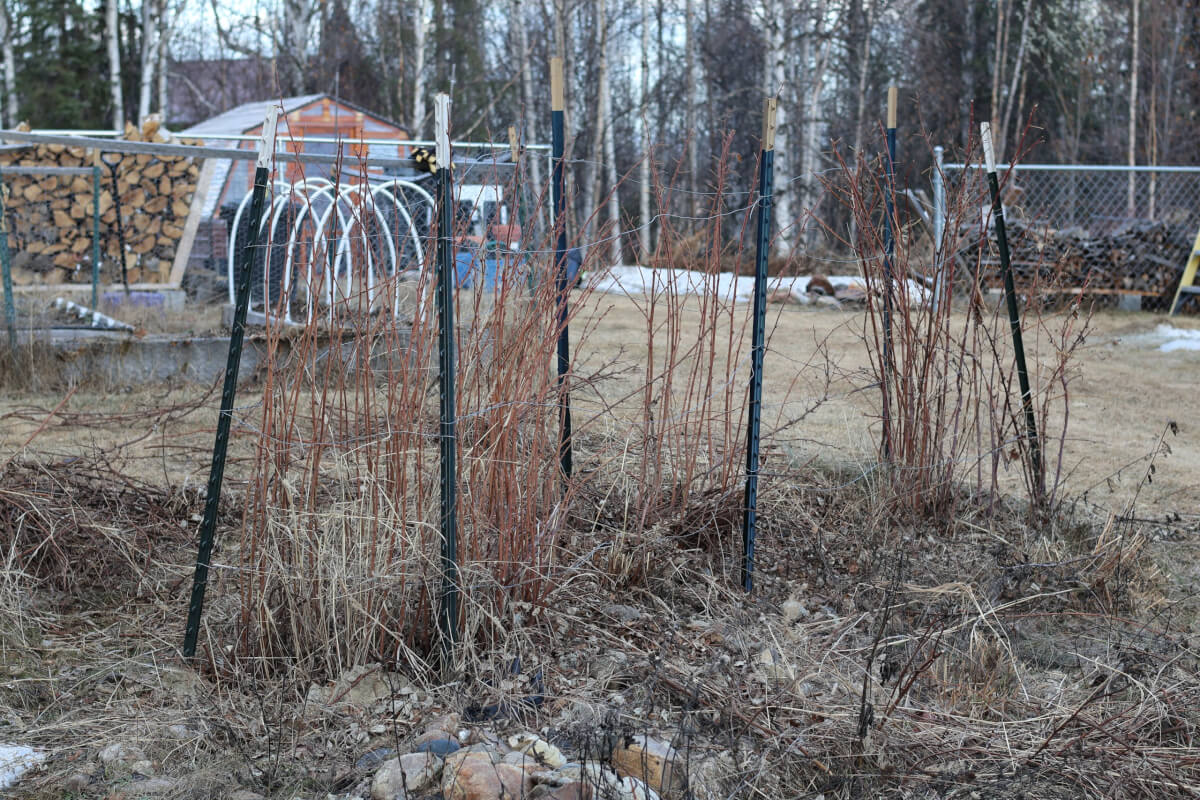We’re back to our early season perennial maintenance! Just in case this one isn’t on your radar, we’re going to talk about early season maintenance for wild and domesticated raspberries!
For those who’ve been around us a few years, you know that we cultivate fully wild varieties of raspberries. These are surprisingly abundant throughout much of zone 2 and 3, all across Alaska and beyond. There really isn’t much information out there on how to semi-domesticate wild raspberries, so we’ve kind of had to pioneer our own path. Turns out, the process isn’t that much different from domesticated varieties.
If you look at traditional “lower 48” care of raspberries, they’ll have you doing this maintenance in the dead of winter when the plant is dormant. We’ve got feet of snow on the ground and negative temperatures at that point, so that’s a no-go for us. We do the next best thing and do our raspberry maintenance as early in the season as we can. Usually, we’ll see the earliest of buds on the plant when we can get to it.
The general goal is to remove old, dead canes from the raspberry cane clusters. The canes that look like they have life in them will be your producing canes that year. You’ll also get new canes that come up over the upcoming season. This clean up helps the plant breathe, grow straight and will generally make it produce better overall. With wild raspberries, you might have quite a few canes laying on the ground under a bunch of leaves and detritus, so be sure to get those too. Oh, and raspberries love to spread out, so sometimes you need to knock down canes that get outside your preferred growing area.
If you’re trying to cultivate a new-to-you wild raspberry patch, there’s some wisdom in just whacking the whole thing to the ground in the early season. Don’t worry, the plant will be fine! This allows you to entirely work with fresh raspberry canes, get the wild patch exactly where you want it and makes it a little easier to tame. Sure, you won’t get raspberries that first season, but you’ll have a much better behaving wild raspberry patch. We found that this caused massive production in the second year (and beyond), so it was worthwhile for us.
While domestic raspberries are fairly good at growing straight and staying in their lane, wild raspberries are not. We’ve found it super helpful to sort of trellis our raspberries. There’s lots of ways to go about this, from sort of “fencing” them in like we did or running a couple of lines (of rope, twine, bailing wire, etc) about 12-18 inches apart and forcing the plants to grow between them. Even then, your wild type will aim to misbehave eventually.
Raspberry canes will compost relatively well, so feel free to add them to your piles. They’ll definitely promote an airy pile. After we did our maintenance again this year, I was again reminded that it’s a good idea to do it with long sleeves on. Otherwise, you’ll get scratched up pretty good and be in pain for a few hours. (Ouch!)
You might argue that wild raspberries are wild, so there’s nothing to be done. And you can do things that way, if you like. But, we’ve seen a significant benefit to treating our wild raspberries similar to domestic varieties. It promotes greater production, more cane development and gets you earlier berries. The bees will appreciate a little bit of room, too.
Good luck with those raspberry patches this season! We’re looking forward to our crop coming in later this year and we’ll be sure to share with you whatever we decide to do with them!


